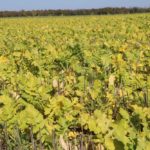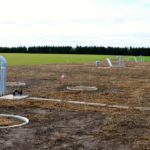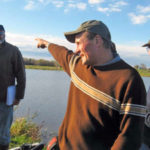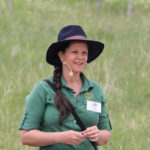Reading Time: 3 minutes My hometown is Stony Plain. It is a great town, progressive, beautiful and welcoming: A place that honours the past and has no fear of the future. I love to go back to visit with my family and friends. I can stand in one spot for hours and simply talk to folks as they pass […] Read more

Preserving highly productive soil is critical for tomorrow
In my hometown, across the province and around the world, top-quality soil is being lost to development

Willing to share a little dirt? Samples wanted
Reading Time: < 1 minute Farming Smarter needs 10 more farms in southern Alberta willing to share a little dirt for the Alberta Soil Health Benchmark Monitoring Project. The project will document soil health indicators at 200 locations in Alberta. Twenty fields were sampled in early summer and another 20 will be sampled this fall. The fields will be re-sampled […] Read more

Stop fighting Mother Nature — because you’re going to lose
Most farmers in Alberta still love tractors more than biology and are heading for big trouble, says Dwayne Beck
Reading Time: 3 minutes Like a voice crying in the wilderness, Dwayne Beck has been beating the drum of soil defence as the foundation for a healthier farming system for decades. To some, the longtime research manager of the Dakota Lakes Research Farm is a wise prophet and caretaker. For others, his message is radical and uncomfortable — something […] Read more

Canada’s soil is in crisis — and change is needed, says advocate
Agronomy has ‘masked’ soil degradation, but the crunch is coming
Reading Time: 4 minutes The biggest crisis facing Canadian agriculture is right beneath our feet. “For the first time in history, we have the technology and tools to produce food in a sustainable way, yet farmers and their influencers cling to old ways and values,” said Don Lobb, an Ontario farmer and a longtime leader in the no-till and […] Read more

Four ways to increase your organic matter
A question that I hear a lot is, “How do cover crops fit into a grain operation?” Lots of grain farmers have no desire to get into the livestock business and no interest in producing hay. But many have some soil issues that need to be addressed. This can be done by buying more iron[...]
Read more
Read more

Canada’s soils still degrading, albeit more slowly
The rate of degradation of soils in Canada has slowed, but it still is happening at a significant rate and there is still a lot to learn. There are no soil-perfect systems yet for crop production, attendees at the Summit on Canadian Soil Health held recently in Guelph heard repeatedly. No-till farming has declined in[...]
Read more
Read more

OMAFRA seen needing a soil health ‘tuneup’
Ontario’s environmental commissioner is calling on the provincial ag ministry to rebuild its soil health expertise and find ways to encourage farmers to adopt soil-friendly production practices, to deal with what she calls a “catastrophic” loss in soil organic matter levels. The report recommends better soil carbon level monitoring and 10-year programs to financially encourage[...]
Read more
Read more

Soil health sensor project largest in North America
A new $2-million soil health research project aims to figure out the impact of different cropping systems on the environment. Research will also be conducted on crop productivity relating to soil health. The result should be new knowledge on productivity of traditional cropping systems versus those with cover crops. The project, at the new Soil[...]
Read more
Read more

Six limiting factors in your soil that will make or break your operation
Without these six key ingredients, your soil — and your farm — could be in trouble
Farms and grazing operations — organic or otherwise — are only as good as their worst resource, according to Oregon-based grazier Abe Collins. “Soil is our primary infrastructure on the farm,” said Collins, who spoke at the recent Organic Alberta conference. “Biologically, chemically, and physically, you need to be looking at the limiting factors in[...]
Read more
Read more

Healthy soil can boost your bottom line
Soil carbon is a bit like a credit card for your plants, says New Zealand soil expert
Reading Time: 3 minutes The Canadian government says six tonnes a hectare is an acceptable level of soil loss each year. Well, that’s not acceptable to soil health expert Nicole Masters. “Soil is our greatest export,” said Masters, director of Integrity Soils in New Zealand. “We took out a lot of our soil resources when agriculture really intensified. You[...]
Read more
Read more

